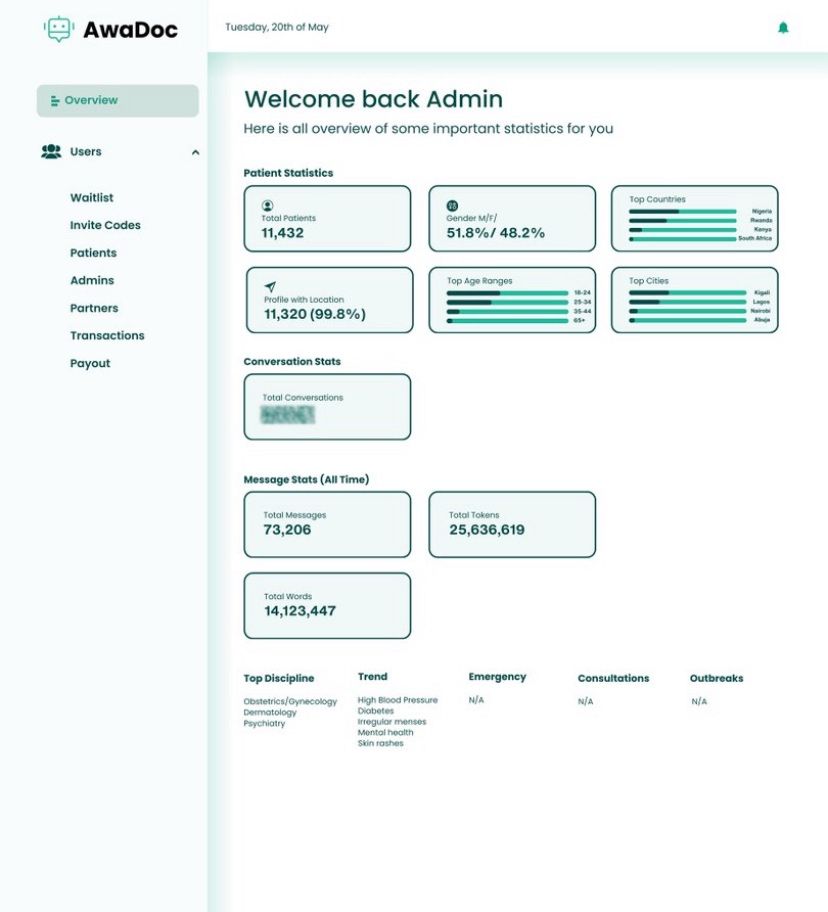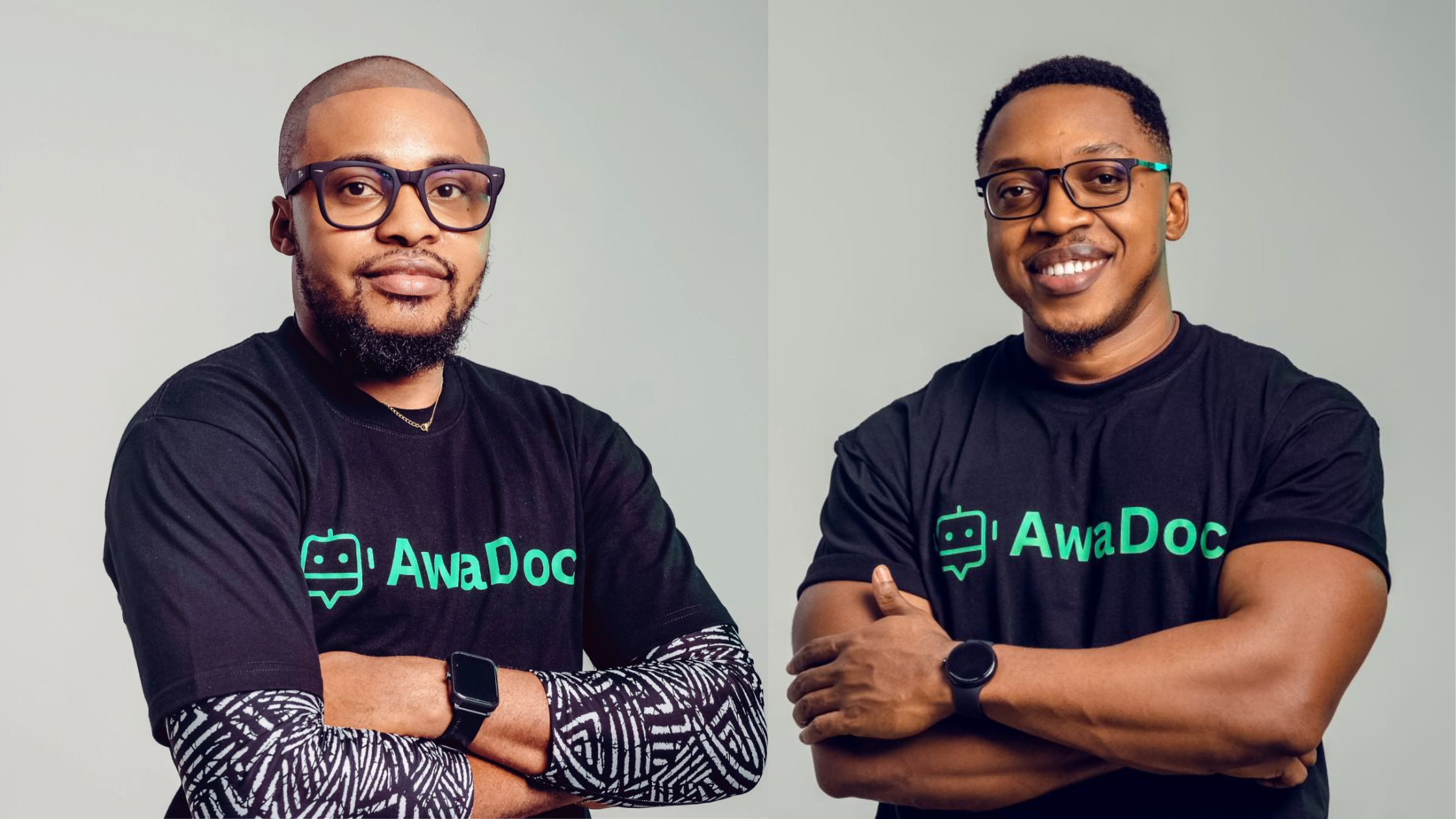A Nigerian health technology startup, has achieved significant early traction after launching an AI-powered health assistant that operates through WhatsApp, processing over 73,000 messages from patients across multiple African countries in its initial weeks of operation.
AwaDoc is an AI-powered chatbot available on WhatsApp. It is designed with ease and affordability in mind. It allows users to get instant answers to health-related questions right from their phones, with no long waits, as opposed to traditional hospital settings.
At its core, AwaDoc is working to close the healthcare gap, especially in regions with limited medical resources. It offers a simple yet powerful solution to help people make informed decisions about their health, using just WhatsApp.
AwaDoc, co-founded by Chinonso Fidelis Egemba and Jesse Benedict has recorded over 11,000 active patients during its beta phase, with demand from an additional 40,000 users awaiting platform access. The service has generated particular activity in major urban centers including Lagos, Abuja, South Africa and Rwanda.
The platform represents a departure from conventional telemedicine approaches by integrating directly into WhatsApp, Africa’s most widely adopted messaging application. Users can submit health queries and receive AI-generated medical guidance without downloading additional applications or navigating complex interfaces.
AwaDoc’s Meteoric Rise After Near-Collapse
Co-founder, Dr. Chinonso Fidelis Egemba found himself on the verge of an emotional breakdown. The rejections left him questioning whether the AI-powered healthcare platform he and Jesse Benedict had built would ever see the light of day.
“I was this close to breaking down,” Egemba recalled, describing how he reached out to his co-founder with a shaky voice, desperately needing support as their startup seemed to slip through their fingers. The weight of constant rejection had pushed the medical professional, known widely as “Aproko Doctor,” to his emotional limits.
But what happened next defied every pessimistic projection. Within days of launching their WhatsApp-based medical assistant, the platform exploded with user adoption. The platform quickly onboarded 11,432 patients, processed over 73,000 messages, and generated more than 25 million tokens of AI interactions.

“I’m not feeling down anymore. In fact, I’m fired up,” Egemba reflected as he watched real-time statistics climb on his dashboard. The same startup that had previously been rejected was now attracting users across major African cities.
AwaDoc Signals It’s Just Getting Started
Although, the health-tech startup had recently raised a portion of their $500K pre-seed round via SAFE on $2.5m valuation. But they are not stopping yet.
The founding team is actively looking for new investment partners who share their vision of making quality healthcare more accessible in emerging markets. Early performance metrics have already caught the attention of those interested in Africa’s growing digital health space.
In attempts to make its leadership stronger, the startup recently appointed Dr. Ibrahim Wada (OON), a respected Consultant Gynaecologist and founder of Nisa Medical Group (Nisa Premier Hospital) as its Chief Medical Advisor and newest board member.
Some appointments aren’t just strategic, they’re symbolic.
Dr Ibrahim Wada joining AwaDoc is one of those moments.
A sign that we’re not just dreaming big, we’re building boldly with the right people.
His deep experience in health systems and public service will be invaluable as we scale AwaDoc across the continent.
I’ll say it again – AwaDoc is redefining what access to healthcare in Africa means.
Grateful for how far we’ve come. Even more excited for what’s next. – Chinonso Fidelis Egemba noted in his LinkedIn Post
To Wrap Up
AwaDoc is taking a practical route to digital healthcare by meeting users where they already are. On WhatsApp. In many African countries, smartphone access may differ from place to place, but messaging apps like WhatsApp are widely used. AwaDoc is sidestepping some of the challenges that often slow down adoption of traditional telemedicine services.
The platform uses artificial intelligence to respond to health-related questions sent via WhatsApp. However, it’s designed to offer early guidance, and not replace visits to a doctor.
So far, the response has been encouraging. This is a sign that there’s real demand for digital health tools that fit into people’s daily lives.
AwaDoc was launched in beta for a small group of users to improve its AI assistant, Noura. This phase helped test performance and gather feedback. While Noura isn’t responding to messages yet, the team is working hard to prepare for a reliable and accurate public release.
You can still add AwaDoc on WhatsApp via +1 (502) 627-0621 or go to awadoc.com to get started.

Source: AwaDoc












